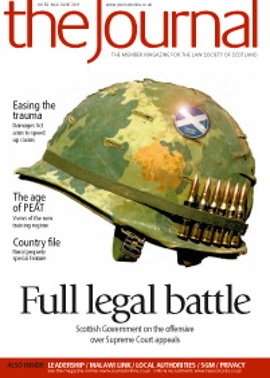Natural justice in play

It is readily accepted by the courts that decision-making bodies, such as the committees of sporting organisations, need not comply with the strict evidential and procedural requirements of the courts in conducting their business and making their decisions. At the same time, it is well established that those bodies must comply with the requirements of natural justice.
A recent case before the disciplinary committee of the Scottish Football Association provided a useful reminder in relation to two important requirements of procedural fairness.
In the case in question, the then President of the Association was in attendance at part of a disciplinary hearing involving the manager of Celtic Football Club to observe the hearing as part of a fact-finding exercise in which he was involved. At the conclusion of the hearing, the President retired with the members of the disciplinary committee and was present during the deliberations of the committee, prior to their decision being made.
On appeal, the Appeals Board of the Scottish Football Association, chaired by Lord Carloway, considered that the presence of the President during the private deliberation of the members of the disciplinary committee was an insurmountable problem in terms of the perceived fairness of the committee’s decision. The Appeals Board set aside the decision of the committee on that basis.
The Appeals Board stressed that it had no basis upon which to conclude that the President attempted to influence the committee’s decision and did not criticise in any way the President’s good faith. Rather, its decision was based on the principle that justice must be seen to be done, especially in disciplinary procedures.
The opportunity test
A good example of the principle is seen in the oft-quoted case of Barrs v British Wool Marketing Board 1957 SC 72.
In Barrs, a wool producer was unhappy with the valuation of his wool under the relevant statutory scheme and appealed to a statutory tribunal. During the tribunal hearing, its members examined the wool in the presence of the representative of the producer, the original valuer, and two other officials. When the tribunal retired, the valuers and the officials retired with them. The producer’s representative was excluded.
In the Outer House, the Lord Ordinary found that the valuers and official took no part in the deliberations and did not speak at that stage. He concluded that, while he considered that the procedure adopted was wrong, no injustice had been done and that the failure of procedure was insufficient grounds to set aside the decision.
The Lord President (Clyde) took a different view in the Inner House. He considered (at p 82) that the “test is not ‘Has an unjust result been reached?’ but ‘Was there an opportunity afforded for injustice to be done?’”
Integrity of the process
Two specific issues arose in the circumstances of the SFA’s case, from which those involved in decision-making bodies and those advising them can draw guidance.
Only decision-makers should be present when decisions are being made
The President of the Association had been noted as being “in attendance” at the hearing, rather than as being a member of the disciplinary committee himself.
In Barrs, the Lord President said this of a situation in which a tribunal is engaged in the final deliberation prior to its decision: “It is quite contrary to British principles of fair play that any person outside the members of the tribunal itself (with the possible exception of their clerk in certain circumstances) should be present when the members are deliberating”.
Persons who have not heard the whole case should not participate in the decision-making process
One possible answer to the issue presented by the presence of the President might have been to regard him as a member of the committee. However, the Appeals Board found that, had that argument been presented, it would have failed, having regard to the principle that a member of a tribunal who has not heard the case should not participate, or be perceived as participating, in the decision-making process. The President had been absent from part of the proceedings before the disciplinary committee and should not, therefore, have been present during deliberations.
An example of that principle is the Inner House decision in Goodall v Bilsland 1909 SC 1152. During the hearing of the case before the licensing appeal court in Glasgow, two members of the bench were absent for a substantial part of the hearing, and thereafter being present, took part in the deliberations of the appeal court, and recorded their votes. In those circumstances, the Lord President held that the whole proceedings were vitiated.
In this issue
- Breaking new ground
- A&A accounts and abatements
- What price privacy?
- Power struggle
- Rural peace?
- Damages for our times
- Grief revalued
- Up to speed?
- Into Africa
- Expenses review opens with invitation on issues
- Law reform update
- From the Brussels office
- Dundee students join advice network
- The learning curve
- Ask Ash
- Guiding hands
- Marriage made in heaven?
- Email on the spot
- One for the accused to prove
- Going for growth
- A brake on termination?
- The colour yellow
- All change on the croft
- Natural justice in play
- Website review
- Book reviews
- A time of opportunity
- Rural property - Who wants to be a green wellie conveyancer?
- Rural property - Buying and selling: pitfalls and problems
- Rural property - In the taxman's sights
- Rural property - Farm tenancies: more changes imminent
- Now we are 10






